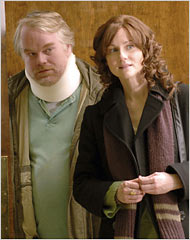 When I ask Laura Linney if getting the green light for a movie set extensively in nursing homes was easy, she leans forward and lets out a loud, disbelieving “God no!” She’s meeting with journalists at the Ritz Carlton hotel in Boston, and she follows with a qualifier. “It’s the dreaded topic,” the actress says. “It instills dread in almost anyone. Thinking about it, having to face it, putting someone there, being in there. But guess what? If it’s a good place? I want to go.”
When I ask Laura Linney if getting the green light for a movie set extensively in nursing homes was easy, she leans forward and lets out a loud, disbelieving “God no!” She’s meeting with journalists at the Ritz Carlton hotel in Boston, and she follows with a qualifier. “It’s the dreaded topic,” the actress says. “It instills dread in almost anyone. Thinking about it, having to face it, putting someone there, being in there. But guess what? If it’s a good place? I want to go.”
She does, in Tamara Jenkins’ new comic drama, “The Savages,” starring with Philip Seymour Hoffman as half of a brother-sister duo coping with putting their father Lenny (Philip Bosco) in a nursing home. The film is one of the first movies released by a major studio (Fox Searchlight) that deals with the topic – “Away from Her,” Sarah Polley’s adaptation of Alice Munro’s story “The Bear Came Over the Mountain,” treaded similar territory. While that film focused on a man losing his wife to Alzheimer’s, the ailing Lenny Savage suffers from dementia. Both deal with the culture of elder care, portrayed as foreign and tragic to grown children and spouses faced with the prospect of turning their loved one over to a slew of anonymous nurses.
“It’s just an emotionally devastating thing to do,” Linney says. “You feel like you’re failing someone. It brings up all sorts of fear.”
In “The Savages,” much of her on-screen sparring with Hoffman is over the level of care Lenny’s getting, as Hoffman’s Jon – a realist – is content to keep their father in the nursing home near his Buffalo house and Linney’s child-like, guilt-ridden Wendy pushes to move him to posher facilities that require interviews and tests. Though Linney says she didn’t intentionally draw from personal experience (her own grandmother was in a nursing home), it seems as though working on the film pushed her to have a difficult, yet essential, conversation with her own older relatives.
“The one thing I did was I sat down with the relatives who hopefully, if I outlive them, I will see them through the end of their lives, and I’m privileged to have that responsibility,” she says, adding that, “I know that when that time comes I’m going to be a mess. I’m not going to see straight. I’m not going to be able to make decisions. I’m going to be in the depths of fear and grief. But when I sat down, I (said) ‘You have to help me, now. I want to know what you want. Let’s do this now so that we can do it while I can laugh about it and you can laugh about it. We can make jokes about it, and then I’ll know what to do. Because I’m going to be all alone and I’m not going to be able to function. Help me now so I can do the right thing when the time comes.’”
-written by Jenny Halper


